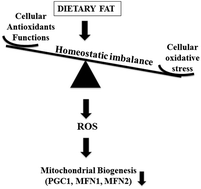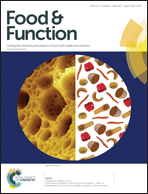Dietary fat proportionately enhances oxidative stress and glucose intolerance followed by impaired expression of the genes associated with mitochondrial biogenesis†
Abstract
Consumption of food that surpasses the metabolic necessity of the body leads to an epidemic condition termed obesity, which causes several metabolic disorders including oxidative damage. Dietary intervention can enlighten the mechanisms and therapeutics associated with these metabolic disorders. The reported studies related to diet include fat of different kinds and from different sources, however they lack dose response aspects. Our study highlighted the importance of dietary fat modification in modulating oxidative stress-induced glucose intolerance. Animals were maintained on a diet with a varied content of fat (30%/45%/60%) for 12 weeks and the ‘withdrawal’ group was fed a standard diet for another 10 weeks. The diet containing 60 energy% of fat displayed glucose intolerance, high ALT, low GSH levels and tissue-specific modulation of the prooxidant/antioxidant enzymatic activities in the liver/muscles. Prolonged sustenance of the 60 energy% fat containing diet-fed rats on standard diet led to the alteration of antioxidant activities, reversing the oxidative damage. Notably, the ‘withdrawal’ group displayed an organ-specific response towards dietary modification where the recovery of the antioxidant activities was observed to be much more pronounced in the liver as compared to the muscle. Further, we identified the differential expression of liver/muscle-specific genes associated with oxidative stress and mitochondrial biogenesis in response to the differing fat content. These genes can serve as markers for HFD-induced metabolic complications involving the liver/muscle. Altogether, our study has highlighted the novel area where obesity-induced oxidative stress linked alterations expressed diet and organ specific responses that are recovered by altering the dietary regimen. Future investigation of dietary modulation will open nascent avenues for developing therapeutic modalities addressing obesity-related metabolic complications.



 Please wait while we load your content...
Please wait while we load your content...